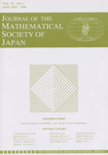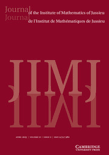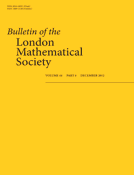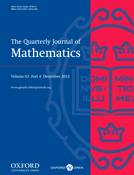
JOURNAL OF THE MATHEMATICAL SOCIETY OF JAPAN
Scope & Guideline
Connecting Ideas and Researchers in Mathematics
Introduction
Aims and Scopes
- Algebraic Geometry and Number Theory:
The journal publishes significant work related to algebraic structures, varieties, and their interactions with number theory, highlighting topics such as moduli spaces, elliptic curves, and more. - Topology and Geometry:
Research focusing on topological spaces, geometric structures, and their properties is a core area, with papers addressing topics like homotopy theory, knot theory, and manifolds. - Analysis and PDEs:
The journal includes studies on functional analysis, partial differential equations, and the mathematical foundations of analysis, often exploring regularity, existence, and uniqueness of solutions. - Stochastic Processes and Mathematical Physics:
There is a growing interest in stochastic processes and their applications to mathematical physics, including the study of diffusion processes and statistical mechanics. - Mathematical Logic and Foundations:
The journal covers foundational aspects of mathematics, focusing on logic, set theory, and category theory, which are essential for the development of mathematical theories.
Trending and Emerging
- Higher Dimensions and Algebraic Structures:
There is a notable increase in research focusing on higher-dimensional algebraic structures, including studies on Fano varieties, algebraic groups, and their applications in various mathematical contexts. - Geometric Analysis and Minimal Surfaces:
Emerging interest in geometric analysis, particularly related to minimal surfaces and variational problems, is becoming more prominent, reflecting a trend towards integrating geometric insights with analytical methods. - Topology and Its Applications:
Recent publications indicate a rising trend in the exploration of topological methods and their applications, particularly in understanding complex systems and geometric configurations. - Stochastic and Random Processes:
There is a growing focus on stochastic processes, especially in relation to mathematical physics and statistical mechanics, indicating a trend towards probabilistic approaches within the journal's scope. - Moduli Spaces and Their Structures:
Research on moduli spaces, particularly concerning algebraic and geometric structures, has gained traction, highlighting their significance in modern mathematical theory.
Declining or Waning
- Classical Analysis and Special Functions:
Papers focusing on classical analysis techniques and special function theory appear to be less frequent, suggesting a shift towards more modern approaches in analysis. - Combinatorial Geometry:
Research related to combinatorial geometry has seen a decline, with fewer publications addressing topics such as geometric configurations and combinatorial structures in recent years. - Discrete Mathematics:
The journal has published fewer papers in discrete mathematics, indicating a possible shift towards more continuous and analytical methods in mathematical research. - Applications of Mathematics to Other Sciences:
While interdisciplinary approaches are important, the journal has seen a reduction in papers explicitly applying mathematical theories to fields outside of pure mathematics, such as biology or economics.
Similar Journals

Journal of the Institute of Mathematics of Jussieu
Advancing Mathematical Frontiers with Every PublicationJournal of the Institute of Mathematics of Jussieu, published by Cambridge University Press, is a leading academic journal that has established itself as a vital resource in the field of mathematics. With an impressive impact factor and a ranking in the top quartile (Q1) of miscellaneous mathematics, the journal serves as a platform for high-quality research from both established scholars and emerging researchers. Spanning from 2002 to 2024, the journal aims to foster collaboration and innovation in the mathematical community by publishing original research articles, reviews, and critical discussions on a wide range of mathematical topics. Although the journal does not offer open access, it remains widely accessible through various academic institutions and libraries, ensuring that critical advancements in mathematics are shared with a global audience. Located in the United Kingdom at the prestigious Cambridge campus, the journal reflects the rigorous standards of its publisher and the rich academic tradition of its home institution.

BULLETIN OF THE BRAZILIAN MATHEMATICAL SOCIETY
Empowering Mathematicians Through Scholarly DiscourseBulletin of the Brazilian Mathematical Society is a distinguished journal published by Springer Heidelberg, aimed at advancing the field of mathematics through the dissemination of research findings and scholarly discourse. With an ISSN of 1678-7544 and an E-ISSN of 1678-7714, this journal is indexed within the Q2 quartile in the field of mathematics (miscellaneous), reflecting its impact and relevance in the academic community. The journal has been recognized for its commitment to quality, as evidenced by its Scopus ranking within the 58th percentile among general mathematics publications. Since its inception in 1996, the Bulletin has served as a vital platform for mathematicians to share innovative ideas, theoretical advancements, and practical applications, making it essential reading for researchers, professionals, and students alike. Open access options are available, ensuring that the latest research is accessible to a wide audience, thereby fostering collaboration and growth within the mathematics community.

Pure and Applied Mathematics Quarterly
Fostering Innovation in Mathematical DisciplinesPure and Applied Mathematics Quarterly is a prestigious journal published by INT PRESS BOSTON, INC, focusing on the diverse and evolving field of mathematics. Since its inception in 2007, this journal has grown significantly, currently holding a Q1 ranking in the Mathematics (Miscellaneous) category for 2023, positioning it among the leading publications in the discipline. With a commitment to publishing high-quality research, Pure and Applied Mathematics Quarterly fosters innovation and dialogue within the mathematical community by providing a platform for theoretical advancements and practical applications. The journal remains accessible to researchers and professionals through its ISSN 1558-8599 and E-ISSN 1558-8602, although it does not currently offer open access. As a vital resource for mathematicians, educators, and students, this journal endeavors to expand the frontiers of mathematical knowledge and contribute to the academic dialogue surrounding this fundamental science.

ANNALES DE L INSTITUT FOURIER
Pioneering Research in Algebra and GeometryANNALES DE L INSTITUT FOURIER is a premier academic journal published by ANNALES INST FOURIER, specializing in the fields of Algebra and Number Theory as well as Geometry and Topology. Since its establishment, the journal has garnered a distinguished reputation, evidenced by its Q1 quartile ranking in the 2023 category assessments and its Scopus Rank of #37 out of 119 in Algebra and Number Theory, and #34 out of 106 in Geometry and Topology, placing it within the top percentile of its field. The journal serves as a vital platform for disseminating groundbreaking research and innovative methodologies, catering to a global audience of researchers, professionals, and students. With a commitment to the advancement of mathematical sciences, ANNALES DE L INSTITUT FOURIER invites contributions that push the boundaries of knowledge and foster collaboration across disciplines. Although it does not offer open access, the rigorous peer-review process ensures that published papers meet the highest academic standards, making it a critical resource for anyone engaged in advanced mathematical research.

ANNALS OF MATHEMATICS
Pioneering Research in the Heart of MathematicsANNALS OF MATHEMATICS is a prestigious peer-reviewed journal published by the Department of Mathematics at Princeton University, dedicated to the advancement of mathematical research across diverse fields, including mathematics, statistics, and probability. With an impressive impact factor reflecting its critical role in the academic community, this journal is categorized within the Q1 quartile rankings for both Mathematics and Statistics in 2023, evidencing its high circulation of influential and often-cited publications. Researchers can access the latest findings and theoretical advancements in an environment that fosters intellectual discourse and innovation, although the journal does not currently offer open access. Spanning a remarkable convergence period from 1996 to 2024, the ANNALS OF MATHEMATICS serves as a vital resource for mathematicians, statisticians, and analysts striving to push the boundaries of knowledge and application in these critical fields.

JOURNAL OF THE AMERICAN MATHEMATICAL SOCIETY
Showcasing Excellence in Theoretical and Applied MathThe Journal of the American Mathematical Society (ISSN: 0894-0347; E-ISSN: 1088-6834), published by the American Mathematical Society, stands as a pillar in the fields of mathematics and applied mathematics. This prestigious journal, with a remarkable impact factor and ranking in the top tier (*Q1*) within both the Applied Mathematics and general Mathematics categories, is recognized for its contribution to advancing mathematical research and theory. With data reflecting it as the 8th ranked journal in General Mathematics (top 2%) and the 34th in Applied Mathematics (top 6%), the journal consistently showcases groundbreaking studies and innovative methods that greatly influence academia and industry alike. Though not an open-access journal, it offers a wealth of resources and intellectual discourse for researchers, professionals, and students alike. Specializing in comprehensive and theoretical aspects of mathematics, the Journal remains dedicated to publishing articles that promote understanding and propel the field forward, highlighting its significance as an essential tool for those engaged in mathematical research.

BULLETIN OF THE LONDON MATHEMATICAL SOCIETY
Exploring Innovative Research in MathematicsThe BULLETIN OF THE LONDON MATHEMATICAL SOCIETY, published by Wiley, is a distinguished journal that serves as a vital resource in the field of mathematics. With its ISSN 0024-6093 and E-ISSN 1469-2120, this journal has consistently provided a platform for innovative research and scholarly discourse since its inception in 1969. Recognized for its quality, it currently holds an impressive Q1 ranking in the mathematics category, a testament to its significance in disseminating influential findings and trends in the mathematical sciences. Researchers and practitioners can rely on the BULLETIN for its comprehensive coverage of both theoretical and applied mathematics, which caters to a diverse audience ranging from professionals to students alike. Though it does not currently offer Open Access options, its articles can be accessed through institutional subscriptions, ensuring that significant works reach the academic community effectively. With contributions that span over five decades, the journal continues to shape mathematical research and inspire future advancements in the discipline.

JOURNAL OF THE KOREAN MATHEMATICAL SOCIETY
Empowering mathematicians through rigorous scholarship.JOURNAL OF THE KOREAN MATHEMATICAL SOCIETY is a premier academic publication dedicated to advancing the field of mathematics through rigorous research and scholarly discourse. Published by the esteemed Korean Mathematical Society, this journal provides a platform for mathematicians and researchers to disseminate their findings, engage in innovative ideas, and connect with the global mathematical community. With an ISSN of 0304-9914 and E-ISSN 2234-3008, the journal has established itself as an important resource in the mathematical landscape, currently holding a Q3 classification in the ‘Mathematics (miscellaneous)’ category as per the 2023 rankings. Though not open access, the journal is committed to promoting high-quality contributions that span various mathematical disciplines, making it indispensable for students, researchers, and professionals alike. Operating from its base in Seoul, South Korea, it contributes to the international mathematics community by publishing cutting-edge research from 1997 to 2024 and beyond, facilitating an avenue for knowledge sharing and innovation in mathematics.

Bulletin Mathematique de la Societe des Sciences Mathematiques de Roumanie
Advancing Mathematical Frontiers in RomaniaThe Bulletin Mathematique de la Societe des Sciences Mathematiques de Roumanie, published by SOC MATEMATICE ROMANIA, is a distinguished platform dedicated to the dissemination of advanced mathematical research and developments. With ISSN 1220-3874 and E-ISSN 2065-0264, this journal serves the global mathematical community, particularly in Romania, fostering collaboration and innovation in varied mathematical disciplines. Despite being categorized in the Q3 quartile of the *Mathematics (miscellaneous)* field and holding a Scopus rank placing it in the 19th percentile, the journal remains committed to publishing high-quality articles that explore theoretical and applied mathematics. Running from 2008 to 2024, it aims to encourage the sharing of knowledge and advancements within both academic and practical domains, affirming its importance as a valuable resource for researchers, professionals, and students alike. Although the journal does not currently offer open access, it contributes to the mathematical discourse through the rigorous selection of papers that adhere to high scholarly standards.

QUARTERLY JOURNAL OF MATHEMATICS
Illuminating the Path of Mathematical DiscoveryQuarterly Journal of Mathematics, published by Oxford University Press, stands as a pivotal resource for the mathematical community, focusing on a broad spectrum of topics in the field of mathematics. With its esteemed history dating back to 1930, this journal continues to foster innovative research and discussions, providing a platform for scholars to share their findings and insights. Although the journal currently holds a Q3 classification in mathematics (miscellaneous) and is ranked #207 among general mathematics publications in the Scopus database, its commitment to quality and rigorous peer review ensures that it remains relevant and insightful. Researchers, professionals, and students alike will find the Quarterly Journal of Mathematics an invaluable tool for advancing knowledge and understanding in various mathematical disciplines, making it an essential addition to any academic library.